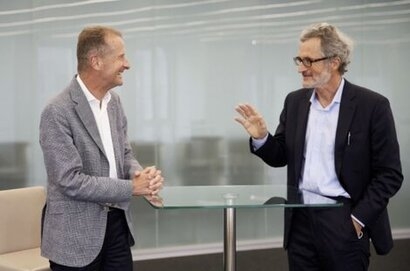
The Sustainability Council called for an even stronger discussion on Volkswagen Group’s corporate purpose to provide CO2 neutral mobility for all, together with a clearly defined end date for internal combustion engines. During the discussion, both sides agreed on a more thorough ESG (Environmental Social Governance) reporting system, and to commission an additional study on socially responsible workforce transition.
The firm commitment of Volkswagen to the EU Green Deal includes the demand for more green energy, faster exit from fossil energy production, rapid expansion of charging infrastructure, and new rules for state aid to strengthen the transformation and decarbonisation of industry and production sites. The nine-member Sustainability Council has been advising Volkswagen on strategic issues relating to sustainability and social responsibility since 2016.
Investment criteria will increasingly centre on ESG aspects, making it necessary for Volkswagen to strengthen its ESG reporting, ensuring transparency and measurability.
“Volkswagen has the opportunity to set itself apart from the competition with its global sustainability agenda” said Georg Kell, Founding Director of the UN Global Compact and Spokesperson for the Sustainability Council. To operationalise an even more systematic ESG management, the Council recommended building up a proprietary data system.
On a political level, former EU Commissioner for Climate Action Connie Hedegaard emphasised the need for strong collaboration between CEOs and European policymakers to demonstrate that European businesses support the target to reduce EU greenhouse gas emissions by 55 percent by 2030 versus the 1990 levels. Volkswagen is a founding member of the “CEO Alliance for Europe’s Recovery, Reform and Resilience” and as such has been fostering the dialogue between politics and business to help implement the European Green Deal to underline the commitment to the demanding climate targets of the European Union. Ottmar Edenhofer, Director of the Potsdam Institute for Climate Impact Research, pointed out the challenges of a carbon border adjustment mechanism that will require international cooperation as well as the need for industry to invest in pilot projects on negative emission technologies (carbon capture). The Council members also called on Volkswagen to set decarbonisation goals in line with the ambition to limit global warming to 1.5 degrees
Regarding a concrete date for the end of the internal combustion engine, Volkswagen CEO Herbert Diess explained that switching to battery-electric vehicles only makes sense from a climate perspective in countries with adequate green energy supplies.
“We’re fully committed to becoming climate- neutral” Diess reiterated. “It’s important to acknowledge that our story is a transition story and we expect the transformation to take two car model lifecycles.” In the EU the end of combustion engine might come earlier after 2030 than in Latin America. Overall, the effectiveness of e-mobility as a driver for climate protection depends on primary energy use..
The top priorities of the Council for the next two years include supporting Volkswagen to become a purpose-driven company, which in the Council’s view is crucial to guaranteeing employees’ buy-in for the transformation.
“It’s the reason that makes employees get out of bed every morning” said Magdalena Gerger, CEO and President of Systembolaget AB. Encouraged by the Council’s recommendation, Volkswagen decided to include the purpose discussion in its “Strategy 2030,” which will be presented later this year.
The transition to e-mobility and digitalisation will also have an impact on employment and workforces. A study by Fraunhofer Institute for Organisation and Industrial Engineering IAO commissioned by the Sustainability Council emphasises that e-mobility and digitalisation will cause a smaller decline in the workforce at Volkswagen than research studies had previously indicated. At the meeting, Michael Sommer, former President of the Confederation of German Trade Unions, presented the plan for a new research project on work and qualification in 2030.
The current five-year plan in China and its impact on Volkswagen were also discussed. Council Member Ye Qi, Professor of Environmental Policy and Management at Tsinghua University Beijing highlighted that the implementation of the plan is expected to require more ambitious decarbonisation measures. Volkswagen Group China already announced that all production sites for the fully electric MEB- platform are to be powered exclusively by green energy.
For additional information:

